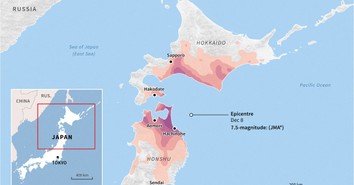New Survey Reveals Evangelicals Make Up Smaller Portion of U.S. Population than Expected

A new survey says that evangelicals make up a smaller portion of the U.S. population than commonly believed, even if they remain a significant demographic. The American Worldview Inventory survey from George Barna at Arizona Christian University found that 10 percent of U.S. adults qualify as evangelicals by using a definition consistent with the National Association of Evangelicals’ own definition. That definition, according to the report, “defines evangelicals as people who recognize their sinful life, rely upon Jesus Christ for their redemption, and receive practical life guidance and wisdom from the Bible in their quest to live under the lordship of Jesus.”
If the 10 percent statistic is correct, then 25 to 30 million adults in the U.S. are evangelical.
“In reality, evangelicals are far fewer in number than typically reported, often are far less biblical in their thinking than one might think, and tend to vote in far fewer numbers than expected,” the report said.
A 2015 Pew study, for example, found that 25.4 percent of U.S. adults were evangelical Protestants.
Compared to the adult population in the U.S., the new report said, the demographic profile of evangelicals shows them to be older than average (median age: 54), more likely to be married to their first spouse (48 percent compared to the U.S. average of 34 percent), less likely to be single and never married (16 percent compared to the national norm of 31 percent), white (74 percent), less likely to identify as LGBTQ (3 percent compared to the U.S. average of 12 percent), and less likely to have been part of an abortion (7 percent compared to 16 percent among non-evangelicals).
“They are less likely to live in the northeastern (10 percent) or western states (16 percent), and comparatively more likely to be located in the southern states (52 percent),” the report said.
The percentage of evangelicals in surveys is often inflated due to self-identification rather than using precise definitions.
“Media reports commonly cite that anywhere from 25 percent to as many as 40 percent of American adults are evangelicals,” the report said. “But those figures are suspect. Most statistics regarding the incidence of evangelicals are based on self-reporting. It is also common for journalists and cultural analysts to deem survey data of self-identified ‘born-again Christians’ and self-identified ‘evangelical Christians’ as the same group, even though theologically speaking, they are not.”
Photo Credit: ©iStock/Getty Images Plus/pcess609
Michael Foust has covered the intersection of faith and news for 20 years. His stories have appeared in Baptist Press, Christianity Today, The Christian Post, the Leaf-Chronicle, the Toronto Star and the Knoxville News-Sentinel.
Listen to Michael's Podcast! He is the host of Crosswalk Talk, a podcast where he talks with Christian movie stars, musicians, directors, and more. Hear how famous Christian figures keep their faith a priority in Hollywood and discover the best Christian movies, books, television, and other entertainment. You can find Crosswalk Talk on LifeAudio.com, or subscribe on Apple or Spotify so you never miss an interview that will be sure to encourage your faith.
Originally published August 13, 2024.







